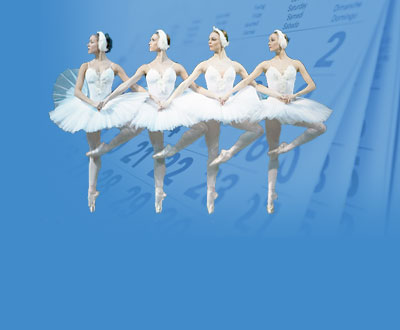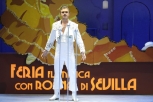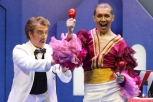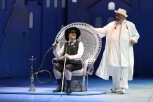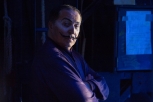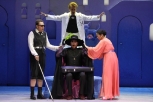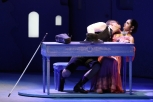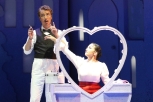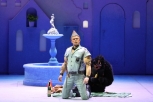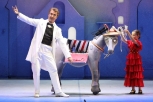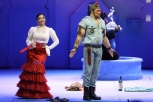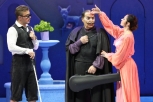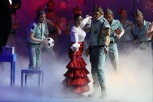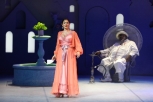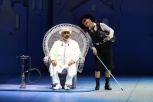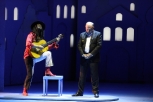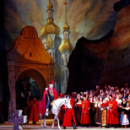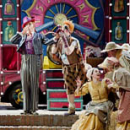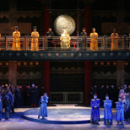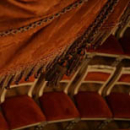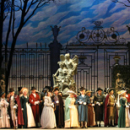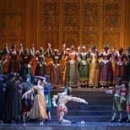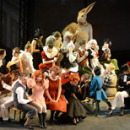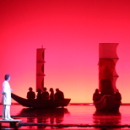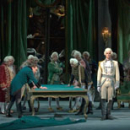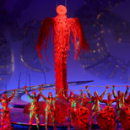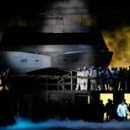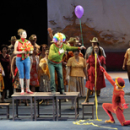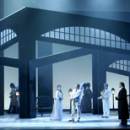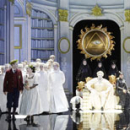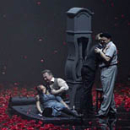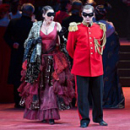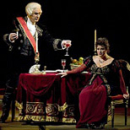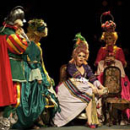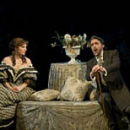Schedule of all St. Petersburg theaters on
one page >>
Please enter theatre's name, actor's name or any other keyword
Il barbiere di Siviglia (Mikhailovsky Theatre, opera)
Genre: Opera Age restriction: 12+ Length: 2 hours 50 minutes
Artists
Conductor — Philipp Selivanov
Credits
Libretto by Cesare Sterbini after the comedy by Pierre-Augustin Caron de Beaumarchais
Musical Director of the production: Mikhail Tatarnikov
Stage Director, Costume Designer: Éric Vigié
Stage Designer: Emmanuelle Favre
Lighting Designer: Alexander Kibitkin
Assistant to Conductor: Philipp Selivanov
Assistant to Costume Designer: Alexandra Leonidova
Artistic Director and Principal Conductor of the Chorus: Vladimir Stolpovskikh
Premiere at the Mikhailovsky Theatre: 7 September 2017
One of the most popular operas in the world whose joyous melodies are instantly recognizable, it has been an indispensable fixture in the Mikhailovsky’s repertoire since 1918, when the Theatre’s own opera company was founded.Swiss director Éric Vigié has created his own unique production of this opera, harking back to a time when opera was not yet seen as the domain of the elites, but was designed to appeal to the most varied audiences.Colourful and heady, Seville is a true Southern city an incomparable microcosm of Spain as a whole. The crowd scenes are filled with footballers, pop stars, flamenco dancers, guitarists and even... a monkey, a donkey, and a ‘little blue dog’. This operatic scherzo — bright, elegant, and unfettered by the traditional canon — is guaranteed to leave audiences in the very best of spirits.Seville. Count Almaviva comes in disguise to the house of Doctor Bartolo and serenades Rosina, whom Bartolo keeps confined to the house. Figaro the barber, who knows all the town’s secrets and scandals, explains to Almaviva that Rosina is Bartolo’s ward, not his daughter, and that the doctor intends to marry her. Figaro devises a plan: the count will disguise himself as a drunken soldier with orders to be quartered at Bartolo’s house so that he may gain access to Rosina. Almaviva is excited and Figaro looks forward to a nice cash pay-off.
Rosina reflects on the voice that has enchanted her and resolves to use her considerable wiles to meet the man it belongs to—as Almaviva has led her to believe, a poor student named Lindoro. Bartolo appears with Rosina’s music master, Don Basilio. Basilio warns Bartolo that Count Almaviva, who has made known his admiration for Rosina, has been seen in Seville. Bartolo decides to marry Rosina immediately. Basilio suggests slander as the most effective means of getting rid of Almaviva. Figaro, who has overheard the plot, warns Rosina and promises to deliver a note from her to Lindoro. Bartolo suspects that Rosina has indeed written a letter, but she outwits him at every turn. Bartolo warns her not to trifle with him.
Almaviva arrives, creating a ruckus in his disguise as a drunken soldier, and secretly passes Rosina his own note. Bartolo is infuriated by the stranger’s behavior and noisily claims that he has an official exemption from billeting soldiers. Figaro announces that a crowd has gathered in the street, curious about the argument they hear coming from inside the house. The civil guard bursts in to arrest Almaviva, but when he secretly reveals his true identity to the captain he is instantly released. Everyone except Figaro is amazed by this turn of events.
ACT IIBartolo suspects that the „soldier“ was a spy planted by Almaviva. The count returns, this time disguised as Don Alonso, a music teacher and student of Don Basilio, to give Rosina her singing lesson in place of Basilio, who, he says, is ill at home. „Don Alonso“ then tells Bartolo that when visiting Almaviva at his inn, he found a letter from Rosina. He offers to tell her that it was given to him by another woman, seemingly to prove that Lindoro is toying with Rosina on Almaviva’s behalf. This convinces Bartolo that „Don Alonso“ is indeed a student of the scheming Basilio, and he allows him to give Rosina her lesson. With Bartolo dozing off, Almaviva and Rosina declare their love.
Figaro arrives to give Bartolo his shave and manages to snatch the key that opens the doors to Rosina’s balcony. Suddenly Basilio shows up looking perfectly healthy. Almaviva, Rosina, and Figaro convince him with a quick bribe that he is in fact ill and must go home at once. While Bartolo gets his shave, Almaviva plots with Rosina to meet at her balcony that night so that they can elope. But the doctor overhears them and realizing he has been tricked again, flies into a rage. Everyone disperses.
The maid Berta comments on the crazy household. Bartolo summons Basilio, telling him to bring a notary so Bartolo can marry Rosina that very night. Bartolo then shows Rosina her letter to Lindoro, as proof that he is in league with Almaviva. Heartbroken and convinced that she has been deceived, Rosina agrees to marry Bartolo. A thunderstorm passes. Figaro and the count climb a ladder to Rosina’s balcony and let themselves in with the key. Rosina appears and confronts Lindoro, who finally reveals his true identity as Almaviva. Basilio shows up with the notary. Bribed and threatened, he agrees to be a witness to the marriage of Rosina and Almaviva. Bartolo arrives with soldiers, but it is too late. He accepts that he has been beaten, and Figaro, Rosina, and the count celebrate their good fortune.
You may also like
-
The Turn of the Screw (Mariinsky Theatre, opera)
Mariinsky (ex. Kirov) Ballet and Opera Theatre- Genre: Opera
- Language: English
-
Mozart. The Marriage of Figaro (Mikhailovsky Theatre, opera)
Mikhailovsky (ex. Mussorgsky) Theatre- Genre: Opera
-
Mazepa (Mariinsky Theatre, opera)
Mariinsky (ex. Kirov) Ballet and Opera Theatre- Genre: Opera
- Language: Russian (English supertitles)
-
L’elisir d’amore (Mikhailovsky Theatre, opera)
Mikhailovsky (ex. Mussorgsky) Theatre- Genre: Opera
- Language: Italian
-
Turandot (Mariinsky II New Theatre, opera)
Mariinsky II (New) Theatre- Genre: Opera
- Language: Italian
-
Carmen (Mikhailovsky Theatre, opera)
Mikhailovsky (ex. Mussorgsky) Theatre- Genre: Opera
- Language: Russian (English supertitles)
-
The Maid of Orleans (Mariinsky II (New) Theatre, opera)
Mariinsky II (New) Theatre- Genre: Opera
- Language: Russian
-
Cavalleria rusticana (Mariinsky II (New) Theatre, opera)
Mariinsky II (New) Theatre- Genre: Opera
-
Otello (Mariinsky II New Theatre, opera)
Mariinsky II (New) Theatre- Genre: Opera
- Language: Italian
-
The Queen of Spades (Mariinsky Theatre, opera)
Mariinsky (ex. Kirov) Ballet and Opera Theatre- Genre: Opera
- Language: Russian (English supertitles)
-
Un ballo in maschera (Mariinsky II New Theatre, opera)
Mariinsky II (New) Theatre- Genre: Opera
- Language: Italian
-
Ariadne auf Naxos (Mariinsky II (New) Theatre, opera)
Mariinsky II (New) Theatre- Genre: Opera
-
Manon Lescaut (Mikhailovsky Theatre, opera)
Mikhailovsky (ex. Mussorgsky) Theatre- Genre: Opera
- Language: Italian
-
Il barbiere di Siviglia (Mariinsky II New Theatre, opera)
Mariinsky II (New) Theatre- Genre: Opera
- Language: Russian (English supertitles)
-
La Cenerentola (Mariinsky Theatre, opera)
Mariinsky (ex. Kirov) Ballet and Opera Theatre- Genre: Opera
-
The Demon (Mariinsky II (New) Theatre, opera)
Mariinsky II (New) Theatre- Genre: Opera
-
Madama Butterfly (Mariinsky II New Theatre, opera)
Mariinsky II (New) Theatre- Genre: Opera
- Language: Italian
-
The Queen of Spades (Mikhailovsky Theatre, opera)
Mikhailovsky (ex. Mussorgsky) Theatre- Genre: Opera
- Language: Russian (English supertitles)
-
Simon Boccanegra (Mariinsky II (New) Theatre, opera)
Mariinsky II (New) Theatre- Genre: Opera
- Language: Italian
-
Snegurochka (The Snow Maiden) (Mariinsky II New Theatre, opera)
Mariinsky II (New) Theatre- Genre: Opera
- Language: Russian (English supertitles)
-
Idomeneo, rè di Creta (Mariinsky II New Theatre, opera)
Mariinsky II (New) Theatre- Genre: Opera
-
I pagliacci (Mariinsky Theatre, opera)
Mariinsky (ex. Kirov) Ballet and Opera Theatre- Genre: Opera
- Language: Italian
-
Rigoletto (Mariinsky II (New) Theatre, opera)
Mariinsky II (New) Theatre- Genre: Opera
- Language: Italian
-
The Gambler (Mariinsky Theatre, opera)
Mariinsky (ex. Kirov) Ballet and Opera Theatre- Genre: Opera
- Language: Russian (English supertitles)
-
Die Zauberflote (Mikhailovsky Theatre, opera)
Mikhailovsky (ex. Mussorgsky) Theatre- Genre: Opera
- Language: German
-
Benvenuto Cellini (Mariinsky II (New) Theatre, opera)
Mariinsky II (New) Theatre- Genre: Opera
-
Eugene Onegin (Vasily Barkhatov production at Mikhailovsky Theatre, opera)
Mikhailovsky (ex. Mussorgsky) Theatre- Genre: Opera
- Language: Russian
-
La Bohème (Mikhailovsky Theatre, opera)
Mikhailovsky (ex. Mussorgsky) Theatre- Genre: Opera
- Language: Italian
-
Aida (Mikhailovsky Theatre, opera)
Mikhailovsky (ex. Mussorgsky) Theatre- Genre: Opera
-
World Opera Stars Gala (Mikhailovsky Theatre, opera)
Mikhailovsky (ex. Mussorgsky) Theatre- Genre: Opera
-
Un ballo in maschera (Mikhailovsky Theatre, opera)
Mikhailovsky (ex. Mussorgsky) Theatre- Genre: Opera
- Language: Italian
-
Tosca (Mikhailovsky Theatre, opera)
Mikhailovsky (ex. Mussorgsky) Theatre- Genre: Opera
- Language: Italian
-
The Oprichnik (Mikhailovsky Theatre, opera)
Mikhailovsky (ex. Mussorgsky) Theatre- Genre: Opera
-
Cinderella (Mikhailovsky Theatre, opera)
Mikhailovsky (ex. Mussorgsky) Theatre- Genre: Opera
- Language: Russian
-
La traviata (Mikhailovsky Theatre, opera)
Mikhailovsky (ex. Mussorgsky) Theatre- Genre: Opera
- Language: Italian


 en
en es
es